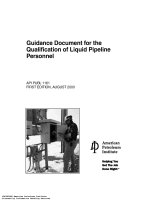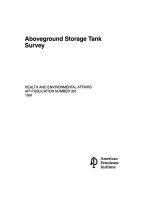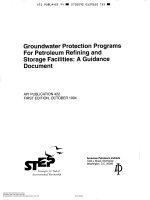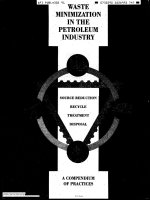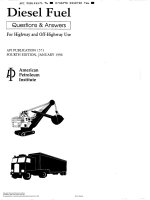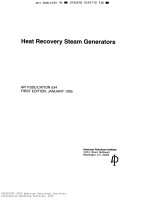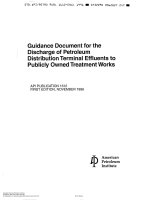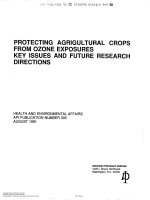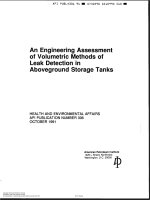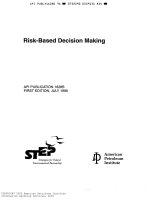Api publ 2378 2000 scan (american petroleum institute)
Bạn đang xem bản rút gọn của tài liệu. Xem và tải ngay bản đầy đủ của tài liệu tại đây (660.1 KB, 21 trang )
American
Petroleum
Institute
1999 Survey on Petroleum Industry
Occupational Injuries, Illnesses, and Fatalities
Summary Report: Aggregate Data Only
As Reported to the
American Petroleum Institute
Covering Petroleum and Petrochemical
Operations of Reporting Companies
--`,,-`-`,,`,,`,`,,`---
API Publication 2378
June 2000
i
Copyright American Petroleum Institute
Provided by IHS under license with API
No reproduction or networking permitted without license from IHS
Not for Resale
STD.API/PETRO P U B L 2378-ENGL 2000
m
0732290 0b2b33b b b O W
API ENVIRONMENTAL MISSION AND GUIDING ENVIRONMENTAL PRINCIPLES
The membersof the American Petroleum Institute are dedicatedto continuous efforts to improve the
compatibility of our operations with the environment while economically developing energy
resources and supplying high quality products andservices to consumers. The members recognize
the importanceof efficiently meeting society’s needs and ourresponsibilityto work with the public,
the government, andothers to develop andto use natural resources in an environmentally sound
manner while protecting the health andsafety of our employees andthe public. To meet these
responsibilities,API members pledge to manage
our businesses according to these principles:
0
To recognixand to respond to community concerns about our raw materials, products and
operations.
To operate our plants and facilities, and to handle our raw materials and products in a manner
that protects the environment, andthe safety and health of our employees and fhe
public.
To make safety, health and environmental considerations a priority in our planning, and our
development of new products and
processes.
To advise promptly appropriate officials, employees, customers and the public of
information on significant industry-retated safety, health and environmentalhazards, and to
recommend protective measures.
0
0
0
0
To counsel customers, transporters and others in the safe use, transportationand disposal of
our raw materials, products and waste materials.
To economically develop and produce natural resources and to conserve those resources by
using energy efficiently.
To extend knowledge by conducting our supporting research on the safety, health and
environmental effects of our
raw materials, products, processes and wastematerials.
To commit to reduce overall emissions and waste generation.
To work with others to resolve problems created by handling and disposal of hazardous
substances from our operations.
To participate with government and others in creating responsible laws, regulations and
standards to safeguard the community, workplace and environment.
To promote these principles and practices bysharing experiences and offering assistance to
others who produce, handle, use,transport or dispose of similar raw materials, petroleum
products and wastes.
--`,,-`-`,,`,,`,`,,`---
Copyright American Petroleum Institute
Provided by IHS under license with API
No reproduction or networking permitted without license from IHS
Not for Resale
-~
~
STD.API/PETRO PUBL 2378-ENGL 2000 E 0732290 Ob26337 5 T 7 m
American
Petroleum
Institute
1999 Survey on Petroleum Industry
Occupational Injuries, Illnesses,and Fatalities
Summary Report:Aggregate Data Only
As Reported to the
American Petroleum Institute
Covering Petroleum and Petrochemical
Operations of Reporting Companies
COPYRIGHT NOTICE
All information offered in this report is the sole and exclusive property of the American Petroleum Institute
You may not reproduce. upload. post, transmit, download. or distribute, resell or otherwise transfer outside
of your company without express consentof the American Petroleum Institute.
CopyrightOtOOO The American Petroleum Institute
Copyright American Petroleum Institute
Provided by IHS under license with API
No reproduction or networking permitted without license from IHS
Not for Resale
--`,,-`-`,,`,,`,`,,`---
API Publication 2378
June 2000
~
~~
~
S T D * A P I / P E T R O PUBL 2378-ENGL
2000
m
~~
0 7 3 2 2 9 0 Ob2b338 4 3 3 H
SPECIAL NOTES
API publications necessarily address problems of a generalnature. With respect toparticular circumstances,
local, state, and federal laws andregulations should be reviewed.
API is not undertakingto meet theduties of employers, manufacturers,or suppliers to warn and properly
train and equiptheir employees, and others exposed, concerninghealth and safety risks andprecautions, nor
undertaking their obligations under local, state, or federal laws.
Information concerning safety and health risks and proper precautions with respect toparticular materials
and conditions should be obtained fromthe employer, the manufactureror supplier of that material, or the
material safety data sheet.
Nothing containedin any API publication isto be construed as granting any right, by implication or
otherwise, for the manufacture, sale, or use of any method,apparatus, or product covered byletters patent.
Neither should anything containedin the publication be construed as insuring anyone against liability for
infringement of letters patent.
Generally, API standards are reviewed and revised, reaffirmed, or withdrawn at least everyfive years.
Sometimes a one-time extension of up or two years will be addedto this review cycle. This publication will
no longer be in effect five years after its publication dateas an operative API standard or, where an extension
has been granted, upon republication. Status of the publication can beascertained from the API Authoring
Department [telephone(202) 682-8000]. A catalog of API publications and materials is published annually
and updated quarterly by API, 1220 L Street, NW, Washington, D.C. 20005.
This document was produced under API standardization procedures
that ensure appropriaie notification and
participation in the developmental process andis designed as an API standard. Questions Concerning the
interpretation of the content of this standard or comments andquestions concerning the procedures under
which this standard was developed should be directedin writing to the director of the Authoring Department
(shown on the title page of this document), American PetroleumInstitute, 1220 L Street, NW, Washington,
D.C.20005. Requests for permission to reproduce or translate all or any part of thematerial published herein
should also be addressed to the director.
API standards are published to facilitate the broad availability of proven, sound engineering andoperating
practices. These standardsare not intended to obviate the needfor applying sound engineering judgment
regarding when and wherethese standards should be utilized. The formulation andpublication of API
standards is not intended in any way to inhibit anyone from usingany other practices.
Any manufacturer marking equipmentor materials in conformance withthe marking requirements of anAPI
standard is solely responsible for complying with all theapplicable requirements of thatstandard. API does
not represent, warrant, or guarantee that such products do
in fact conform to the applicable API standard.
ii
Copyright American Petroleum Institute
Provided by IHS under license with API
No reproduction or networking permitted without license from IHS
Not for Resale
--`,,-`-`,,`,,`,`,,`---
API publications may be used by anyonedesiring to do so. Every effort has been made bythe Institute to
assure the accuracy and reliability of the data contained in them; however, the Institute makes no
representation, warranty or guarantee in connection with
this publication and hereby expressly disclaims any
liability or responsibility for loss or damage resulting fromits use or for the violation of any federal, state, or
municipal regulation with which this publication mayconflict.
S T D - A P I / P E T R O P U B L 2378-ENGL 2000
D 0732290 Ob2b339 37T I
I
FOREWORD
API publications may be used by anyone desiringto do so. Every effort has been made by theinstitute to
assure the accuracy and reliability of the data contained in them; however, the institute makes no
representation, warranty, or guarantee in connection with this publication and hereby expressly disclaims any
liability or responsibility for loss or damage resulting from its useor for the violation of any federal, state, or
municipal regulation with whichthis publication may conflict.
Suggested revisions are invited and shouldbe submitted to the director of the Regulatoryand Scientific
Affairs Department, American Petroleum Institute,1220 L Street, N.W., Washington, D.C. 20005.
--`,,-`-`,,`,,`,`,,`---
Copyright American Petroleum Institute
Provided by IHS under license with API
No reproduction or networking permitted without license from IHS
iii
Not for Resale
--`,,-`-`,,`,,`,`,,`---
STD.API/PETRO PUEIL 2378-ENGL Z O O 0
E 0732Z90 Ob26340 091
m
Table of Contents
Page
Introduction ..............................................................................................................
1
summary ..................................................................................................................
2
Table 1: U.S. Industry Totals by Function
...............................................................
6
Table 2: Non-US . Industry Totals by Function :.....................................................
8
S u m m a r y of Fatal Injuries.....................................................................................
10
List of Participants .................................................................................................
12
V
Copyright American Petroleum Institute
Provided by IHS under license with API
No reproduction or networking permitted without license from IHS
Previous page is blank .
Not for Resale
STD-API/PETRO
PUBL 2378-ENGL 2000
11111 0732290 Ob263Yl4 T28
m
INTRODUCTION
The American Petroleum Institute (API) has
published this report since 1931. It includes information
regarding workplace injuries, illnesses, fatalities, lost workday cases, and incidence ratesby industry
segment and functions.
Prior to this year’s survey, companies wereonly asked to submit data about their own employees in
their US.operations. To increase the value of this report, the scope was expanded to include non-U.S.
operations. Additionally,data was collected for four new functions: Upstream Support Service,
LubricantslSpecialties, Downstream Support Services, and Power Generation and two new incident
rates: Days Away plus Restricted Activiv Cases and Days Away Cases.
--`,,-`-`,,`,,`,`,,`---
Another major change introduced was
the ability for companies to submit their data electronically
over the Internet. Some of the features of this online database include automatic data checks, online
instructions, andreports. It also provides companies that are willing to share their data withthe ability
to produce customizedreports allowing themto benchmark againsttheir peers.
Participation in the API annual survey is voluntary and company participation varies from year to
year. Therefore, exercise caution when usingthis data to characterize the performance ofthe industry
as a whole. However,eighty companies that responded to this year’s survey with U.S. operations data
also responded to lastyear’s survey. Theseeighty companies represent ninety percentof the total
number of employees and eighty-nine percent
of the total number of hours repofted toAPI for 1999.
Participants were askedto submit dataaccording to theBureau of Labor Statistics (BLS)
Recordkeeping Guidelines for Occupational Injuries and Illnesses, September 1986 edition. Therefore,
this report provides incidence ratesper 200,000 hours worked on the same basis as those reported by
BLS.
One hundred and fourteen companies respondedto the survey. All but one of these companies
submitted data forU.S.operations. Thirteencompanies submitted data for non-U.S. operations.
1
Copyright American Petroleum Institute
Provided by IHS under license with API
No reproduction or networking permitted without license from IHS
Not for Resale
-
STDmAPIIPETRO PUBL 2378-ENGL
2000
m
0732270 Ob26342 764
m
SUMMARY
U.$.Operations: Company Employees
1999 datapertaining to U.S. occupational injuries, illnesses and fatalities for an employer's own
employees were submitted to the American Petroleum Institute (API) by one hundred andthirteen oil and
gas companies(including eight subsidiaries), employing 174,368 persons with a total work experience of
357 million hours. In 1998, one hundred and eighteencompanies reported 212,850 employees with a
work experience of 435 millionhours.
In 1999, the Total OSHA Recordable Case Incidence Rate reported was 1.60, comparedto 1.34 for 1998.
This rate isthe number of total recordable cases per 200,000 hours worked, or approximately the number
of cases per 1O0 full-time workers per year.
The FataI PIus Days Away IncidenceRate reported for 1999 was .49 per 200,000 hours worked-r
case forevery 204 employees,compared to .33 in 1998-01- one case for every 303 employees.
one
Since 1986,the reported Total OSHA Recordable Case Incidence
Rate and FataI plus Days Away
Incidence Rate have improved an average of 2.9 and 3.9 percent peryear, respectively (see the figure
below).
Rep0rtedU.S. Occupational Injuries, Illnesses, and Fatalities in the Petroleum Industry
4
I
1986
1987
1988
1989
1990
1991
1992
1993
1994
1995
1996
1997
1998
1999
"-+-Total
OSHA Recordable Case Incidence Rate
- -e- Fatal plus Days Away Cases Incidence Rate
--`,,-`-`,,`,,`,`,,`---
Copyright American Petroleum Institute
Provided by IHS under license with API
No reproduction or networking permitted without license from IHS
Not for Resale
Significant differences exist among companiesregarding return-to-work policies and practices.
Therefore, use of theFatal plus Days Away IncidenceRates alone tojudge and compare company safety
performance is not recommended.
The Bureau of LaborStatistics (BLS) publishes employment figures for different sectors of the petroleum
industry. The table below shows the number offull-time employees in the U.S. company information
section of this report andthe comparative total employment figures published by BLS. These figures can
be used to calculate the API survey representation rate.
The API U.S. company information is limitedto company employees only while the BLS has a more
inclusive definition of employment (the BLS includes contract workers). Therefore, use caution when
interpreting these representation rates.
Employment in the Petroleum Industry
E&P and Drilling
Refining
47.2
BLS
293.1
API
28.5
API Representation Rate
10%
and Gas Processing
Oil
Pipelines
92.1
38.5
Total
Marketing
13.3
855.0
9.7
5 1%
73%
5%
Employmentfigures are in thousands. 1999 BLSfigures are current as ofMarch2000.
Non-U.S.Operations: Company Employees
Thirteen oil and gascompanies reported data about their non-U.S. operations. During 1999, these
companies employed 57,844 employees with a total work experienceof 124 million hours.
In 1999, theTotal OSHA Recordable Case Incidence Rate reported was .54 for non-U.S. operations. This
rate is the number of total recordable cases per
200,000 hours worked or approximately the number of
cases per 1O0 full-time workers per year.
The Fatal Plus Days Away Incidence Rate
reported for 1999 was .16 per200,000 hours worked-r
case for every 625 employees.
one
Trends
The totalOSHA recordable incidence rateas reported to API has declined by more than half over
the past
ten years. The followinggraphs show the ten-yeartrend for selected U.S. petroleum industrysectors.
--`,,-`-`,,`,,`,`,,`---
Copyright American Petroleum Institute
Provided by IHS under license with API
No reproduction or networking permitted without license from IHS
3
Not for Resale
Total OSHA Recordable Incidence Ratesin the U.S.
8.80
BLS Private Sector lncidence Rates Declined 24%
a
BLS Industry Incidence Rates Declined 23%
5.70
l
4.40
--`,,-`-`,,`,,`,`,,`---
5.5z
ndustry Incidence Rates Declined 55%
2
O
1990
1991
1992
1993
1994
1995
1996
1997
1998
1999
Year
Total OSHA Recordable Incidence Rates for US. Petroleum Industry
Total Offshore and Onshore
E&P. Drilling and Gas Processing Sectors as Reported to API
4
4
$
3
Q
I
O
1998 1997 1996 1995 1994 1993 1992 1991 1990
-
1999
Year
E&P and Drilling
4
Copyright American Petroleum Institute
Provided by IHS under license with API
No reproduction or networking permitted without license from IHS
Not for Resale
-
'Gas Processing
STD.API/PETRO PUBL 2378-ENGL 2 0 0 0
H 0732290 Ob2b345 b 7 3 IB.
Total OSHA Recordable Incidence Rates forU.S. Petroleum Industry
Marketing and Refining Sectorsas Reported toAPI
--`,,-`-`,,`,,`,`,,`---
-
1-
0 -
19941993199219911990
1995 19971996
-
1998
1999
YC a r
*Refining
+Marketing
Total OSHA Recordable IncidenceRates for U.S. Petroleum Industry
Pipeline, Marine and Petrochemical Manufacturing Sectors as Reported to API
~~
1996199519941993199219911990
1991 19991998
+Pipeline
Copyright American Petroleum Institute
Provided by IHS under license with API
No reproduction or networking permitted without license from IHS
-
Year
O *Marine
5
Not for Resale
-+-Petrochemical
Manufacturing
2000
0732270 Oh2634b 50T W
--`,,-`-`,,`,,`,`,,`---
S T D - A P I / P E T R O PUBL Z.378-ENGL
Copyright American Petroleum Institute
Provided by IHS under license with API
No reproduction or networking permitted without license from IHS
Not for Resale
9 0732290 0626347 4 Y b
m
--`,,-`-`,,`,,`,`,,`---
S T D = A P I / P E T R O PUBL 2378-ENGL 2000
Copyright American Petroleum Institute
Provided by IHS under license with API
No reproduction or networking permitted without license from IHS
Not for Resale
II
?
~~
382 I
I
--`,,-`-`,,`,,`,`,,`---
STD.API/PETRO PUBL 2378-ENGL 2000
0732290
Ob2b346
hl
a,
Copyright American Petroleum Institute
Provided by IHS under license with API
No reproduction or networking permitted without license from IHS
Not for Resale
2000
0732290
--`,,-`-`,,`,,`,`,,`---
S T D D A P I I P E T R O PUBL 2 3 7 8 - E N G L
m
Copyright American Petroleum Institute
Provided by IHS under license with API
No reproduction or networking permitted without license from IHS
Not for Resale
~
~
STD*API/PETRO PUBL 2378-ENGL 2000
W 0732270 Ob26350 T30 I
1999 Summary of Fatal Injuries in the Petroleum Industry
As Reported to the American Petroleum Institute
U.S. Company Operations
One hundred and thirteen oil and gascompanies and their subsidiaries, employing 174,368 workers
reported seven fatal accidents during 1999. This is equivalent to one fatality for every24,9 1O workers
employed. Comparatively, in 1998, there was one fatality for every 19,350 employees. The graph below
shows the number of fatalities reported in this publication for the last 14 years.
Reported U.S.Occupational Fatalities in the Petroleum Industry
The changein the number of employeesrepresented by this survey every year accounts for some of the
variation in the data. Therefore, the following graph shows the fatality ratel for the past 14 years.
However, as with any data, the factorsthat cause variations over time can also be cyclical, seasonal,
trend, or irregular (random).Any combination of these factors can further cloud any visual interpretation
of the data. Because this is annual data, cyclical and seasonal variations may be discounted. By
calculating a moving average2 for each year,we can smooth-outthe effect of irregular variations and thus
observe a trend. The fatality rate in the petroleum industrycontinues to improve as shown below bythe
five-year movingaverage line.
--`,,-`-`,,`,,`,`,,`---
Reported US.Occupational Fatality Ratesin the Petroleum Industry
(per 100,000 Employees)
19S6
1987 1988
1989
1990
1991
1992
1993
1994
1995
I996
199'7
1998
1999
0
Fatality Rate +Five-Year Moving Average
' Fatality rate = (number of fatalities*lOO.OOO)/numberof employees. This is the number of fatalitiesper 100.000 employees.
' A five-year moving average for a given year is the average of that year and the 4 preceding years. For example. the S-year moving average for
1990. using rounded numbers. shown on the graph equals (4+17+10+8+5)/5=8.8.
Copyright American Petroleum Institute
Provided by IHS under license with API
No reproduction or networking permitted without license from IHS
10
Not for Resale
~~~
STD.API/PETRO PUBL 2378-ENGL 2000
m 0732290
062b353.977 m
Non-U.S. Company Operations
--`,,-`-`,,`,,`,`,,`---
Thirteen companies, employing 57,844 workers, reported ninefatal accidents during 1999. This is
equivalent to one fatality for every 6,427 workers employed.
Copyright American Petroleum Institute
Provided by IHS under license with API
No reproduction or networking permitted without license from IHS
11
Not for Resale
W 0732290 ObZb352 803 .
I
I
1999 Survey of Occupational, Illnesses and Fatalities in the Petroleum Industry
List of Participants
S T D * A P I / P E T R O PUBL 2378-ENGL 2000
Type of Data Reported
COMPANY
Algonquin Gas Transmission
All ~ m ~ r i c aPipeke.Lp.
n
AlyeskaPipine Service Company
,Amerada
.
. HessCoqxmiibn
.
.
.".
Anadarko PetrƯleum Corporation
Anschntz &c%h" .WPlpeIine
.~
,". IC
Atlantic'kichfield Company
M C 0 Pipe Line Company
,.,,,
. ,.
Barger EngineeringInc
J y ?F o e pipehe company
Berry Petroleum Company
&HP.Petmkurr.@mei&jas) k c
Big 'West OiVFlyingJ Inc
BP ;Amoc0 Pipeliae.m+essupit
Buckeye Pipe LineCompany
'
,, , ,,
,
,
, ,,
x
";,",:,
,
,,
,
,
,
,
,,"
,"
-
us.
Non-U.S.
Company
Operations
Company
Operations
X
X'
X
X
X
X
X
--`,,-`-`,,`,,`,`,,`---
X
X
X
X
X
X
X
X
X
X
X
X
X
X
X
X
X
X
X.
X
, .
- x
Chevron Pipe Line Company
chicap Pipe Linecompany
cinia Pipe' Line Company
Cìtgo Petrolem Corporation
Citgo Pipelinecompany
Clark Refíning & M q k e h g
Colonial Pipeline Company
Conoco Inc
Cook Inlet Pipe LineCompany
Croft Petroleum Company
Cross Oil Refining& Marketing
Devon Energy Corporation
Dixie Pipeline Company
Dome pipehe Corporation
Eberly & Meade Inc
Embassy Oil
Enbridge (U.S.) Inc
Enbridge &@&es (North Dakota) Inc
Energy Pro Inc
Enterprise Products Operating
Equilon EnterprisesLLC
Equilon Pipeline Company
Equistar Pipeline Operations
Ergon Inc
Excalibar Exploration Inc
x
X
X
X
X
X
X
X
X
X
X
X
X
X
X
X
X
X
X
X
X
X
X
X
12
Copyright American Petroleum Institute
Provided by IHS under license with API
No reproduction or networking permitted without license from IHS
Not for Resale
X
S T D = A P I / P E T R O PUBL 2378-ENGL 2000
m
0732270 0626353 74T W
1999 Survey of Occupational, Illnesses and Fatalities inthe Petroleum Industry
List of Participants
Type of Data Reported
U.S.
Company
Operations
COMPANY
Explorer Pipeline Company
Exxon Company USA
Emon Pipehe Company
X
X
Fina Inc
Fina Oil & Chemical Company (Pipelines)
Great Western Drillhg
X
X
Operations
X
Green Ênergy Inc
Hunt Oil Company
Interstate.Enercompany
a
Justiss Oil Company Inc
b
e
bPipeLine Company
KentÙcky Hydrocarbon
Kerr-McGee corporation
Lone Mountain Production Company
Loop LLC
Lyondell-Citgo RefiningCompany
Marathon Ashtand Petrolem
--`,,-`-`,,`,,`,`,,`---
Marathon Ashland Pipe Line
Marathon Oil Company
McGowan Working Partners
Michael D L U S
Mitchell Energy Corporation
Mobil Oil Corporation
Motiva Enterprises LLC
MR Drilling Company
Navajo Refining Company (Pipeline Div)
Occidental Oil 6t Gas Corporation
Ocean Energy
Ouachita Exploration Inc
Patina Oil & Gas Corporation
Petroleos Mexicanos
Phillips Petroleum Company
Phillips Pipe Line Company
Placid Refining Company
Plantation Pipeline Company
Portland PipeLine Corporation
Questar Pipeline Company
Razorback Pipeline Company
Saco Oil Company
Santa Fe Snyder Corporation
Seadrifi Pipeline Corporation
Seneca Resources Corporation
Shakespeare Oil Company Inc
Shell Oil Company
South Carolina Pipeline Corporation
Stokes Production
sunoco Inc
Copyright American Petroleum Institute
Provided by IHS under license with API
No reproduction or networking permitted without license from IHS
Non-U.S.
Company
13
Not for Resale
X
X
X
X
X
X
X
X
X
X
X
X
X
X
x
X
X
X
X
X
X
X
X
X
X
X
X
X
X
X
X
X
X
X
X
X
X
X
X
X
X
X
X
X
X
X
X
STD-API/PETRO
PUBL 2378-ENGL
m
2000
0 7 3 2 2 9 0 0626354 686
II
1999 Survey of Occupational, Illnessesand Fatalities inthe Petroleum Industry
List of Participants
Type of Data Reported
us.
Non-U.S.
COMPANY
TepPCo
Tellepsen pipeline servic&hnpäny
Tesoro Petroleum CompaniesInc
Tex- . .Inc
,. . .
.
Texas Eastern Transmission Corporation
, , . , ,C
,,,
T ~ &
o ~ ~
T ~ MOU&
S
Oil Pipe iine'corporation
Tmknontaigne
.,
Pipehe,hc',
United RefmingCompany
Unocal,.,.
Pipeline Company
UOP Inc
,
,
,
.
1
," , "
, ,
, ,
,
1
,
",,,
Company
Company
Operations
Operations
X
X
X
X
X
X
X
X
X
X
X
x
x
X
..
.
--`,,-`-`,,`,,`,`,,`---
X
X
X
X
X
X
X
X
Copyright American Petroleum Institute
Provided by IHS under license with API
No reproduction or networking permitted without license from IHS
Not for Resale
